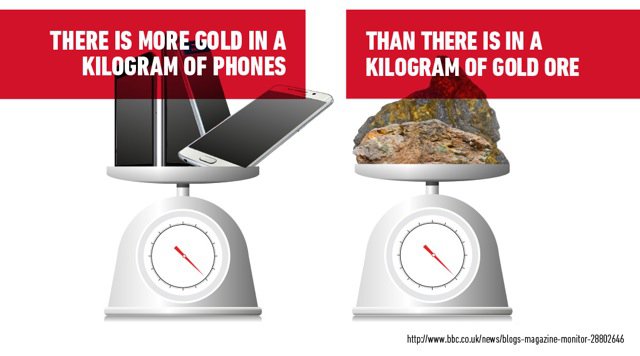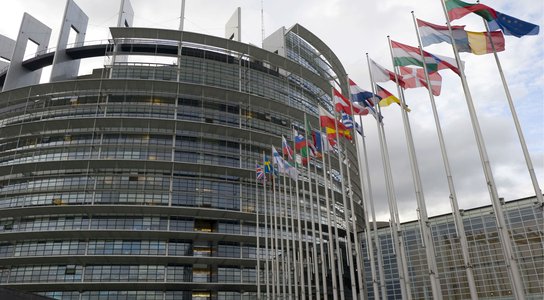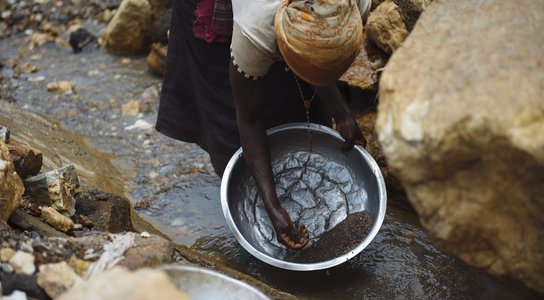Read our policy proposals for implementation of the new EU regulation on responsible mineral sourcing in English and French
In September 2013, our coalition published its first position paper on the upcoming EU conflict minerals law. We explained how the global trade in natural resources finances conflict and fuels human rights abuses, and why companies should source responsibly through a process known as supply chain due diligence. You can read our position paper in English and French.
In a disappointing development, the European Commission published a weak legislative proposal in March 2014. It put forward a scheme that would be voluntary for 300-400 importers of tin, tantalum, tungsten and gold—just 0.05% of companies using and trading these minerals in the EU. Its scheme leaves out minerals found in products like mobile phones, cars and laptops. And it ignores entirely the role that other minerals and natural resources play in driving conflict and human rights abuses.
Members of our coalition criticised the Commission’s proposal, as did business leaders, investors and religious leaders. The winner of the EU’s 2014 Sakharov prize, Dr Denis Mukwege of the Democratic Republic of Congo (DRC), made a passionate plea for stronger EU regulation as part of his acceptance speech.
In February 2015, members of our coalition called on Member States and the European Parliament to reject the Commission’s weak approach and instead create leading legislation. We recommended replacing the opt-in scheme with a mandatory due diligence requirement, in line with international standards. We asked for the scope of companies covered by the law to be broadened. And we called for the material scope to be widened, to include other minerals and resources.

The committee leading the European Parliament’s response to the proposed law, the Committee on International Trade (INTA), published a draft report in February. The report offered a worrying insight into the Committee’s intentions. Rather than showing leadership on this issue, the Committee’s Rapporteur, Mr Winkler MEP, suggested weakening the draft law even further. You can find our response here.
Despite the calls of investors, consumers and civil society, the INTA Committee missed a critical opportunity when it voted on the law in April 2015. A majority of members voted for a weak and ineffective law that, if passed, would undermine global attempts to clean up the trade. You can find our joint response here. We discuss why the proposal is not effective, and why the trade in products like mobile phones and laptops matters.
In a landmark moment, the European Parliament rejected INTA’s weak approach and voted in support of a strong and binding law on 20 May 2015. The Parliament’s proposal could make a real difference to the lives of those suffering under the trade in conflict minerals. It would require companies importing tin, tungsten, tantalum and gold to meet existing international standards. Crucially, it would require companies importing minerals within products, such as laptops and mobile phones, to source responsibly for the first time.
You can read our response to the Parliament’s vote, and what it means for Member States, in English and French.
Following the EU's adoption of the responsible sourcing regulation, a lengthy phase-in period started. It gives companies, EU Member States, and EU institutions time to adjust to the new law. A number of important decisions will be made during this period, many of which will have a big impact on how effective the new law ultimately becomes. In this policy brief, Global Witness and other civil society organisations outline key recommendations for this "implementation period" to companies, Member State enforcement authorities, and the EU Commission to ensure the EU's new law is properly implemented and enforced, and ultimately delivers on its promise of more responsible mineral supply chains in Europe.
Contacts
You might also like
-
Briefing Conflict Minerals in Europe
After years of campaigning by Global Witness and civil society partners the EU has reached a political understanding on a new law intended to break the links between the minerals trade, conflict and human rights abuses.
-
Campaign Responsible minerals
The global minerals trade has funded abuses and armed conflict for decades. Minerals that have bankrolled social and environmental harms still end up in our mobile phones, laptops and cars.
-
Briefing What is Supply Chain Due Diligence?
Unless companies make sure they are trading responsibly, they risk funding serious abuses overseas.